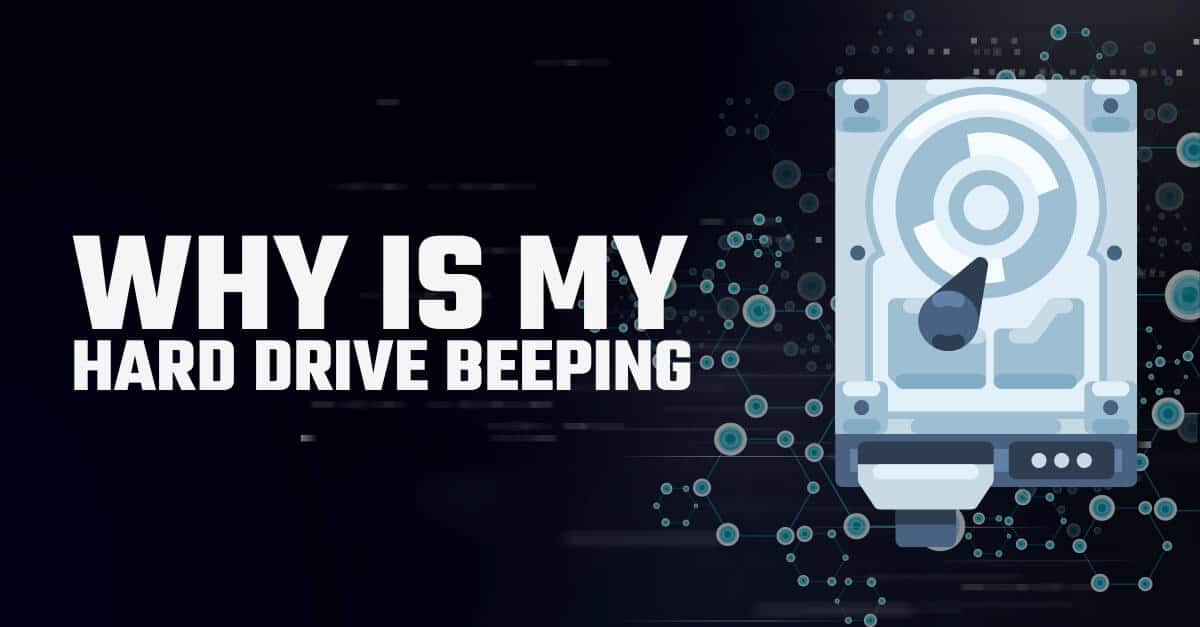Everything You Need to Know About Hard Drive Beeping

That Annoying Beeping Noise? Surprise, It's Your Hard Drive!
Beep. Beep. Beep. Hear that? Is it coming from the TV? From your phone? Or is it the garbage truck backing into your mailbox? Unfortunately, no. This beep is coming from your hard drive.
Navigating the World of Hard Drive Beeping
We’ve all been there. Sitting at our computer, working away, enjoying the quiet hum of the machine when you’re suddenly interrupted by a shrill, metallic sound. The beep comes from your hard drive suddenly and without warning. And, once the beeping begins, you’re endlessly annoyed.
What was once a peaceful pastime of browsing the internet or chatting with friends on social media quickly deteriorates and becomes a struggle of wills. Your patience (and sanity) versus the hard drive beeping.
But how did you get here? And is there anything you can do? All this, and more, will be explored as we share everything you need to know about hard drive beeping.

Why is my Hard Drive Beeping?
Hard drives—really all types of hardware—can make sounds for any number of reasons. This equipment is made with many small moving parts. If any one of them is misaligned or malfunctioning, your device will probably produce a noise.
In the case of hard drives, they’re never designed to make a sound. So, if yours is beeping, you know you’ve got a problem on your hands. You can listen to examples of beeping and clicking drives in another DriveSavers blog article, What Causes Hard Drive Clicking? Here are five of the most common causes of hard drive beeping:
Read/write-heads are stuck
Read/write heads often get stuck on the platter. These are delicate pieces of equipment made with tiny components, and they’re susceptible to breakage. This often happens if the hard drive was recently dropped or bumped.
Spindle motor malfunction
This is one of the most common causes of hard drive beeping. Spindle motors fail frequently, and when they do, they can leave many strange symptoms in their wake. If the spindle motor fails, the platters won’t move. And that can cause a beeping sound.
Broken cable or port
Your hard drive may also beep if the USB cable or port isn’t working properly. Usually, the port is the issue, not the cable. This often happens if the machine was physically moved while cords were still plugged into the ports. You can do a bit of troubleshooting by using a different cable or different port and determine the cause by process of elimination.
Low or no power
If a hard drive’s electronics can’t supply enough power to spin the motor, you might hear a beeping sound. The spindle is designed to spin the platters, but if there isn’t enough power to do so, the sound you hear is the spindle attempting, in vain, to do what it was designed to do.
Spindle motor failure and power failure are often confused. Both prevent the spindle from operating as designed, which can be confusing to the novice user. However, power failure is much rarer and far less likely than spindle motor failure.
Complete hard drive failure
Every hard drive will eventually fail. When they do, they can make some pretty strange noises, including beeps. If you’ve already ruled out the previously mentioned causes of beeping, hard drive failure could be the culprit.
You should always be backing up regularly to prevent data loss. But if you haven’t been, and you hear that dreaded beeping sound, do your best to retrieve your data from the hard drive before it fails completely.
What Are The Risks of Hard Drive Beeping?
If you’re struggling with hard drive beeping, or even external hard drive beeping, you’re at high risk for a bad outcome, including total data loss or complete hard drive failure. So, after backing up what you can, turn the computer off and step away. Don’t attempt any DIY fixes, software or at-home troubleshooting. Resolving a problem with your hard drive beeping without incurring permanent damage is best left to the professionals.
Can Hard Drive Beeping Be Fixed?
The answer is yes but probably not on your own. After reading some of the common causes of hard drive beeping, you may be feeling confident about your diagnostic skills, but don’t let a little knowledge cloud your judgment. Trying to fix hard drive beeping, including external hard drive beeping, without the proper tools and expertise puts you at high risk of permanently damaging your equipment and completely losing your data.
The bottom line, you can’t fix this on your own, but there are professionals out there who can. When you engage a hard drive recovery company (like DriveSavers), first they’ll diagnose the problem. Let’s use a Seagate hard drive beeping caused by sticking read/write heads and damaged platter as an example. In this case, data recovery professionals use filesystem metadata to read and copy data from used areas in the beeping hard drive.
However, if the beeping hard drive is encrypted, data recovery isn’t so simple, because engineers have a much harder time telling used and unused data apart. The alternative is to create a total copy of the disk, both of the used and unused areas, since encryption prevents engineers from viewing what’s actually important to save. After a copy is made, and the drive is decrypted, you can determine which areas need to stay and which can go.
Whether your beeping hard drive is encrypted or not, the important takeaway here is that your information can be recovered—but only with the assistance of a qualified data recovery specialist who knows what they’re doing.Are you struggling with hard drive beeping and need help saving your data? Contact DriveSavers today to expertly recover your information.


